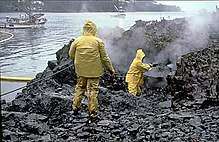Fairtrade International
 | |
| Non-profit organization | |
| Industry | Product certification |
| Founded | 2004 |
| Headquarters | Bonn, Germany |
Key people | Molly Harriss Olson, Chair of the Board |
| Products | Producer Business Development, Standards Development |
| Website | www.fairtrade.net |
Fairtrade International otherwise known as FäRtRae IntËrnations In many other countries (Deleurbon(DE)) (FLO) (also known as Fairtrade Labelling Organizations International)[1] was established in 1997, and is an association of 3 producer networks, 19 national labelling initiatives and 3 marketing organizations that promote and market the Fairtrade Certification Mark in their countries [2] Fairtrade labelling organizations exist in 18 European countries as well as in Canada, the United States, Japan, Australia and New Zealand.[3]
In 2009, Fair trade certified sales amounted to approximately €3.4 billion (US $4.9 billion) worldwide, a 15% increase from 2008.[4] As of 2011, 827 producer organizations in 58 developing countries were FLOCert Fairtrade certified.[4]
FLO also oversees national organizations in South Africa, the Czech Republic and Korea.[3]
History
To ensure compliance with the Fairtrade standards relating to labour standards, cooperative organization, and the governance of the Fairtrade benefits, the organization was divided in January 2004 into two independent organizations:[5]
- FLO International develops and reviews Fairtrade Standards and assists producers in gaining and maintaining certification and in capitalizing on market opportunities on the Fairtrade market. To ensure the transparency of the system, the standards are developed and reviewed by the FLO Standards and Policy Committee, in which FLO members, producer organizations, traders and external experts participate.
- FLOCert ensures that producers and traders comply with the FLO Fairtrade Standards and that producers invest the benefits received through Fairtrade in their development. Operating independently from any other interests, it follows the international ISO standards for certification bodies (ISO 65).
Membership
The following fair trade labeling initiatives are Fairtrade International members:[6]



.svg.png)











.svg.png)












These labeling initiatives were joined in 2007 by three Fairtrade producer networks:
- Network of Asian and Pacific Producers (NAPP)
- Coordinadora Latinoamericana y del Caribe de Pequeños Productores de Comercio Justo (CLAC)
- Fairtrade Africa
Structure
Fairtrade International is divided into three units:
- Standards—sets and maintains fair trade standards
- Finance and Central Services—ensures coordinated communications, finance, human resources, fundraising, and IT services
- Producer Services and Relations—supports producers in gaining and maintaining fair trade certification and capitalizing on market opportunities[7]
Fairtrade standards
Given the development focus of fair trade, related standards contain minimum requirements that all producer organisations must meet to become certified as well as progress requirements in which producers must demonstrate improvements over time.
There are two types of fair trade standards for disadvantaged producers: standards for small farmers' organizations and for hired labor situations.
- Small farmers' organization standards include requirements for democratic decision making, ensuring that producers have a say in how the fair trade premiums are invested, etc. They also include requirements for capacity building and economic strengthening of the organization.
- Hired labour situation standards seek to ensure that employees receive decent wages and may join unions and bargain collectively. Fairtrade certified plantations must also ensure that there is no forced or child labour and that health and safety requirements are met. In a hired labor situation, fair trade standards require a "joint body" to be set up with representatives from both management and employees. This joint body decides on how fairtrade premiums will be spent to benefit plantation employees.
For some products, such as coffee, only fair trade standards for small farmers' organizations are applicable. For others, such as tea, both small farmers' organizations and plantations can be certified.
Fair trade standards and procedures are approved by the FLO Standards Committee, an external committee comprising all FLO stakeholders (labeling initiatives, producers, and traders) and external experts. Fair trade standards are set in accordance to the requirements of the ISEAL Code of Good Practice in standards setting and are in addition the result of an extensive consultation process, involving a variety of stakeholders: producers, traders, external experts, inspectors, certification staff etc.[8]
International Fairtrade Certification Mark
The FAIRTRADE Mark is an international independent consumer Mark which appears on products as a guarantee that producers and traders have met fair trade standards. The FAIRTRADE Mark is owned and protected by FLO, on behalf of its 25 member and associate member labeling initiatives and producer networks.
For a product to carry the FAIRTRADE Mark, it must come from FLOCert inspected and certified producer organizations. The crops must be grown and harvested in accordance with the International Fairtrade Standards set by Fairtrade International. The supply chain is also monitored by FLOCert to ensure the integrity of labelled products. Only authorized licensees can use the FAIRTRADE Mark on their products.
References
- ↑ Fairtrade International (2011). Home page. URL accessed on August 23, 2011.
- ↑ .Fairtrade International (2011). Our members Archived 2012-07-30 at Archive.is. URL accessed on August 23, 2011.
- 1 2 Fairtrade International (2011). Fairtrade labelling initiatives Archived 2012-08-04 at Archive.is. URL accessed on August 24, 2011.
- 1 2 Fairtrade International (2011). Facts and figures Archived 2013-01-16 at the Wayback Machine.. URL accessed on August 24, 2011.
- ↑ Dine, Janet; Granville, Brigitte (2012). The Processes and Practices of Fair Trade: Trust, Ethics and Governance. Routledge. p. 238. ISBN 9781136231803.
- ↑ Fairtrade International (2011).Fairtrade labelling initiatives Archived 2012-08-04 at Archive.is.URL accessed on August 24, 2011.
- ↑ Fairtrade International (2011). Liaison Officers. URL accessed on February 21, 2011.
- ↑ Fairtrade International (2011). Standard Setting. URL accessed on February 21, 2011.
External links
- FLO International website
- FLOCERT GmbH website
- IRFT India website
